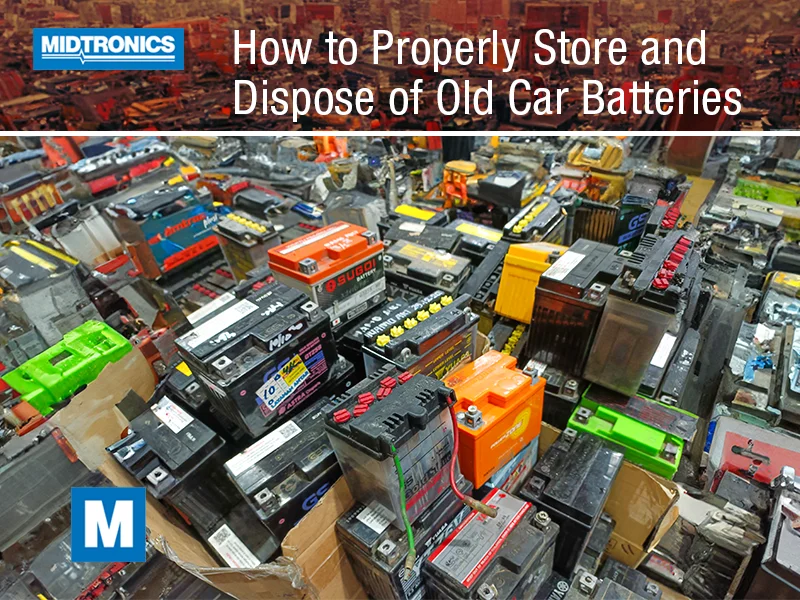With a typical battery lifespan of around three to five years and an average vehicle lifecycle of around 13 years, changing a car battery is going to be necessary at some point. For many vehicles, it’ll need to happen three or four times before the vehicle is taken off the road and out of service indefinitely. And while the process is easy enough to complete safely, what’s often neglected is the care of storing and disposing of old car batteries.
There’s immense amounts of energy stored in a good battery, and even in a depleted one, there’s enough to cause serious harm. Whether you’re new to the auto repair industry or you’re a lifelong technician or service professional, it pays to revisit best practices occasionally. Review why it’s important to store new and old batteries safely, and best practices for it.
A Battery Accident that Could’ve Been Avoided
This anecdote has been provided from an employee at a franchised car dealership that witnessed this account firsthand. Imagine how it could play out in your shop.
At the back corner of the repair shop, near an overhead door and an exit, an employee noticed some smoke late in the workday. A closer look revealed that it was coming from a pallet of old car batteries, and it was more than just smoke – a fire had broken out. After alerting others nearby of the fire, staff grabbed a couple of fire extinguishers and doused the flames.
Luckily, it was only one car battery that was aflame, along with the wooden pallet it was on. The other 15 or so old batteries had not yet been exposed to the heat or direct flame, indicating that the fire had just started. The damage was very isolated, and aside from removing the burnt pallet and battery and moving the other old batteries, no remediation was required other than airing out the shop.
What had happened? It’s not completely clear, but the dealership employee thought that the battery that was involved had tumbled from where it was stacked. Perhaps it arced against another battery, or maybe it cracked and leaked. Sulfuric acid itself isn’t combustible, but it can cause other combustible materials to ignite – such as the wood pallet the batteries were on – potentially starting the fire.
Since the accident, the shop has implemented a new process for storing batteries, both the new ones in their parts department as well as the old ones removed from vehicles and ready for disposal. It was clearly a close call and, had the accident happened after hours, it could’ve brought the whole dealership to the ground in ashes.
The Right Way to Store Used Car Batteries
What, then, is the correct method for storing the old car batteries that are so often replaced in a repair shop? Even though the batteries are partially or completely discharged, the process is the same as storing a new battery like you would in the parts department.
Safely store the batteries upright
It might seem like it goes without saying, but car batteries that have been removed and are ready to be disposed of should still be kept upright. Preventing the electrolyte from leaking is key, and so is eliminating the chance of arcing across posts.
Not only should the batteries be stored upright, but there should be no opportunity for them to fall over. Stacking old batteries should be avoided.
Keep combustible materials away
Store batteries on racking that isn’t combustible and isn’t easily corroded. Choosing a simple solution like plastic pallets can be great whereas wood pallets might be best to avoid. Also, keep cardboard, paper, and other organic materials that could be flammable away from the batteries.
Have proper ventilation
Offgassing can be as dangerous as arcing batteries, especially where stored batteries are. If gases released by batteries collect in a contained area, it can raise the potential for a catastrophic situation. Ventilation is crucial, so keeping the batteries in an area where there’s air movement on a consistent basis will help dissipate any gases.
Keep the temperature cool
Although the concern isn’t necessarily as prevalent with old batteries than with new ones, it’s still a good plan to maintain a cool ambient temperature around old batteries. Around 60F is good, and it’s best to avoid extreme heat or cold such as outdoor storage. Even for short-term storage, the potential for a problem increases.
How to Dispose of Old Car Batteries
The space needed to store old batteries in a shop can quickly become annoying and intrusive, especially in seasons like winter and summer when replacements are happening frequently. It’s even more so an issue when the batteries must be stored in a single layer rather than stacked. So, the first suggestion or disposal is to routinely have your batteries delivered to or picked up by a recycler.
Local recyclers tend to have pickup services for batteries along with other scrap metals like catalytic converters and brake rotors, or have a staff member collect the materials and drop them off in person. Be sure that, if you have someone on your staff delivering the items to a recycler that they’re aware of proper handling techniques including eye and hand protection as well as secured single-layer storage.
When they’re recycled, 99 percent of the materials in the battery will be harvested and reused to manufacture new products. Perhaps even more importantly, it will keep batteries from cluttering an area and becoming a safety concern in your shop.




